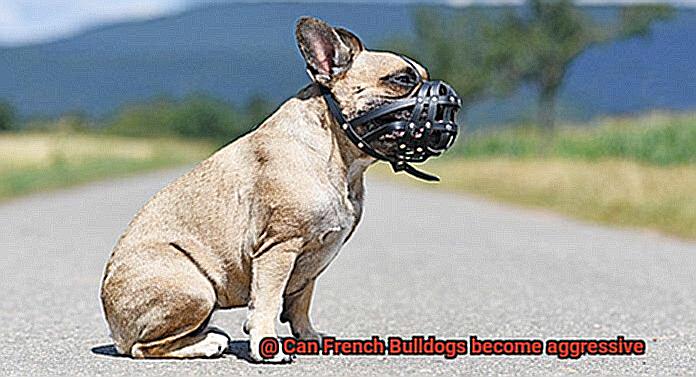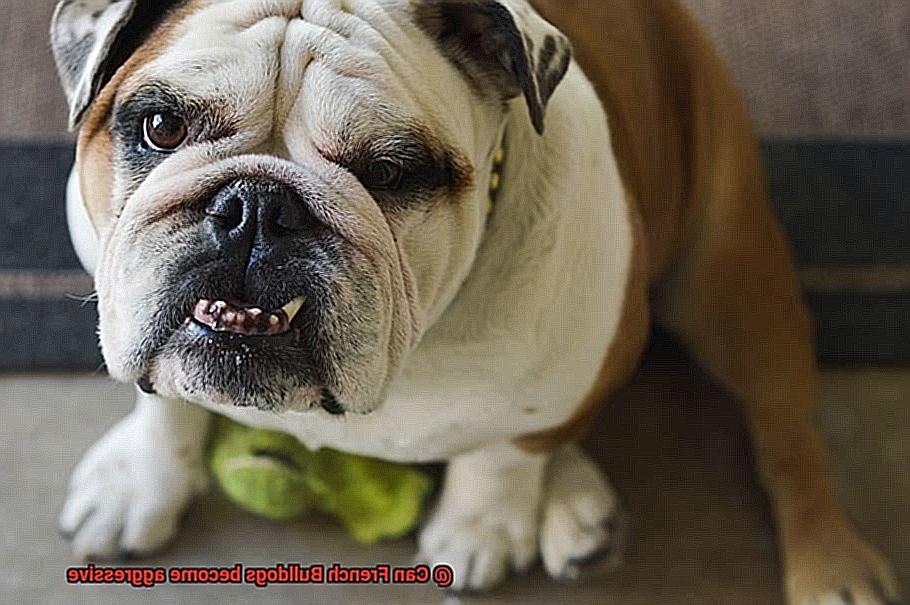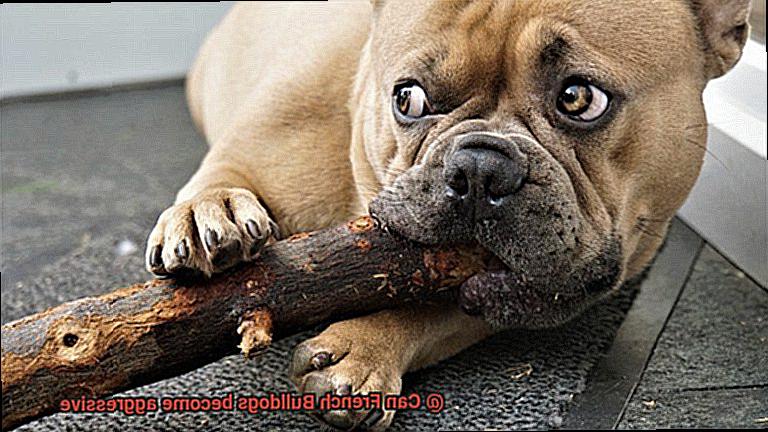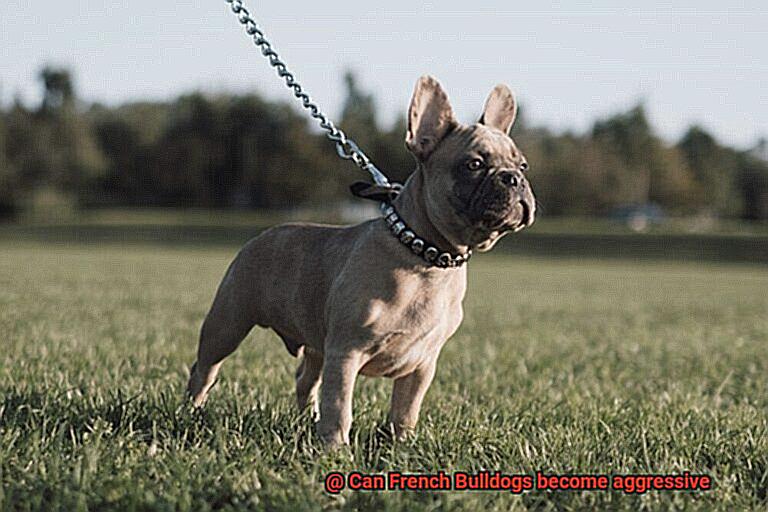Can French Bulldogs become aggressive?
French Bulldogs have stolen the hearts of dog lovers everywhere with their endearingly squishy faces, snorting shenanigans, and affectionate nature. They’re like the Charlie Chaplins of the dog world, effortlessly melting our hearts with their charming personalities. But amidst those googly eyes and wrinkled snouts, one question lingers: can French Bulldogs become aggressive?
In this captivating blog post, we’ll dive deep into the potential for these lovable pets to show a more assertive side. While their small stature and friendly demeanor may make them seem like docile companions, it’s important to recognize that any dog breed – regardless of size or reputation – has the capacity for aggression.
Join us as we explore the factors that can contribute to aggression in French Bulldogs, keep an eye out for warning signs, and discover how owners can prevent and manage these feisty behaviors. Let’s embark on a thrilling journey into the world of French Bulldogs and uncover the truth behind their seemingly calm exterior – get ready for an adventure.
What Causes Aggression in French Bulldogs?
Contents
- 1 What Causes Aggression in French Bulldogs?
- 2 The Role of Genetics in French Bulldog Aggression
- 3 Socialization and Training for French Bulldogs
- 4 Environmental Factors Impacting French Bulldog Aggression
- 5 Neutering or Spaying Your French Bulldog to Reduce Aggression
- 6 Signs of Aggression in French Bulldogs
- 7 Seeking Professional Help for Your Dog’s Aggression
- 7.1 Understanding the Importance:
- 7.2 Identifying Signs of Aggression:
- 7.3 Assessing Behavior and Developing a Treatment Plan:
- 7.4 Learning Effective Techniques and Strategies:
- 7.5 Medication as an Option:
- 7.6 Early Intervention is Key:
- 7.7 Expertise in French Bulldog Behavior:
- 7.8 Ensuring Safety for All:
- 7.9 Addressing Underlying Emotions:
- 8 Responsible Ownership to Prevent French Bulldog Aggression
- 9 Conclusion

French Bulldogs are renowned for their friendly and sociable nature, but it’s important to acknowledge that any dog breed can exhibit aggressive behavior under certain circumstances.
Here, we will explore the various factors that can contribute to aggression in French Bulldogs and provide insights on how to address and manage this behavior effectively.
Genetics:
Just like humans, dogs inherit certain traits from their parents and ancestors. While French Bulldogs are generally bred for a friendly disposition, some individuals may inherit aggressive tendencies. It’s crucial to note that aggression is not a common trait in the breed, but genetic factors can play a role in shaping a dog’s temperament.
Lack of Socialization:
Proper socialization during the critical developmental stages is essential for preventing aggression in French Bulldogs. If they are not exposed to different people, animals, and environments at a young age, they may become anxious or fearful in unfamiliar situations, leading to aggressive responses.
Fear:
Fear is a common trigger for aggression in French Bulldogs. When they feel threatened or perceive danger, they may resort to aggressive behavior as a way to protect themselves or their territory. It’s important to create a safe and secure environment for your French Bulldog to minimize fear-based aggression.
Territoriality:
French Bulldogs are naturally protective of their homes and families. If they perceive someone as intruding on their territory, they may display aggressive behaviors to defend it. Proper training and socialization can help establish boundaries and prevent territorial aggression.
Resource Guarding:
Some French Bulldogs may exhibit resource guarding behaviors, becoming possessive and protective of certain items such as food, toys, or even their owners. They may become aggressive when they feel that their prized possessions are being threatened or taken away. Positive reinforcement training techniques can help address resource guarding tendencies.
Health Issues:
It’s important to consider health issues as a potential cause of aggression in French Bulldogs. Pain or discomfort from medical conditions such as injury, illness, or hormonal imbalances can lead to irritability and aggression. Regular veterinary check-ups can help identify and address any underlying health issues.
The Role of Genetics in French Bulldog Aggression
Understanding the genetic factors that can contribute to aggression in French Bulldogs is crucial for owners and breeders alike. While these adorable dogs are generally known for their friendly and sociable nature, aggression can sometimes be a part of their behavioral repertoire. So, let’s dig deeper into the fascinating world of genetics and how it influences aggression in French Bulldogs.
Genetic Predispositions:
French Bulldogs, like any other breed, can have genetic predispositions that increase the likelihood of aggressive behavior. One significant factor is their brachycephalic skull structure. While this gives them their unique appearance, it can also lead to health issues such as respiratory problems and neurological abnormalities. These health issues can potentially contribute to aggressive behavior in French Bulldogs.
In addition to this, certain genes associated with aggression have been identified in other dog breeds and may also be present in French Bulldogs. These genes influence neurotransmitter levels, impulse control, and reactivity, ultimately shaping a dog’s aggressive tendencies.

The Complexity of Genetics:
Aggression is a complex trait influenced by multiple genes. Pinpointing specific genetic factors responsible for aggression in French Bulldogs is challenging due to this complexity. However, understanding that genetics play a role can help owners and breeders take appropriate measures to prevent or manage aggressive behavior.
Responsible Breeding Practices:
Breeders have a crucial role in minimizing the risk of aggression in French Bulldogs. Selecting parent dogs with stable temperaments and no history of aggression is vital. Additionally, genetic testing and screening for known aggression-related genes can help identify potential risks and enable informed breeding decisions.
Environmental Factors and Individual Experiences:
It’s important to note that genetics alone do not determine a dog’s behavior. Environmental factors, socialization, training, and individual experiences also play a significant role in shaping a dog’s temperament and behavior. Providing proper socialization, training, and a nurturing environment are essential for preventing or addressing any signs of aggression in French Bulldogs.
Socialization and Training for French Bulldogs
French Bulldogs are adorable and popular pets known for their friendly and affectionate nature. However, like any other breed, they can exhibit aggressive behavior if not properly socialized and trained. In this section, we will delve into the significance of socialization and training for French Bulldogs, highlighting the benefits and techniques that can help mold them into well-behaved companions.
Early Socialization:
Early socialization plays a crucial role in preventing fear or aggression towards unfamiliar people or animals. Introducing your French Bulldog to various environments, such as parks, beaches, and busy streets, will help them become comfortable and confident in different settings. Additionally, meeting different people, including children, adults, and the elderly, is essential for teaching French Bulldogs how to interact politely with strangers.
Proper Socialization Techniques:
Proper socialization also involves introducing French Bulldogs to other animals, such as dogs and cats, to prevent aggressive behavior towards them in the future. The key is to expose them to these experiences gradually and positively. Controlled interactions with gentle and well-behaved animals can foster positive associations and reduce the likelihood of aggression.

Importance of Training:
Training is equally important for French Bulldogs to become well-behaved and non-aggressive pets. Basic obedience training helps establish control over their behavior. Teaching essential commands like sit, stay, come, and leave it allows you to effectively communicate with your French Bulldog.
Positive Reinforcement:
Positive reinforcement training methods are highly effective for French Bulldogs. Using treats or praise as rewards for good behavior helps build a strong bond between you and your furry friend while encouraging desired behaviors. Remember to be consistent in providing cues and rewards to reinforce the desired behaviors consistently.
Professional Guidance:
Enrolling your French Bulldog in puppy training classes or working with a professional dog trainer can be incredibly beneficial. These experts can provide guidance on effective training techniques specifically tailored for the breed, taking into account their unique characteristics and needs.
Exercise and Mental Stimulation:
Regular exercise is crucial for French Bulldogs as it helps release pent-up energy and reduces the likelihood of behavioral problems, including aggression. Engaging them in mental stimulation activities, such as puzzle toys or obedience training sessions, can also prevent boredom-related aggression.
Supervision:
When introducing your French Bulldog to new people, animals, or environments, it is essential to supervise their interactions. This allows for immediate intervention if any signs of aggression or fear are displayed, ensuring the safety of everyone involved.
Environmental Factors Impacting French Bulldog Aggression
French Bulldogs, with their charming personalities and lovable nature, are often adored for their friendly and non-aggressive demeanor. However, it’s important to understand that aggression in French Bulldogs can be influenced by environmental factors rather than being an inherent trait.
In this blog post, we will explore how socialization, training, living environment, other pets in the household, and the owner’s behavior and lifestyle can impact French Bulldog aggression.
Drawing on research notes and first-hand experience, we will provide insights to help you cultivate a harmonious relationship with your French Bulldog.
The Power of Socialization:
Proper socialization is crucial for French Bulldogs to develop confidence and a positive outlook towards new experiences. Early exposure to different people, animals, and environments helps them build resilience and reduces the likelihood of fear or anxiety-based aggression later in life.
Training Techniques that Work:
Consistent and positive reinforcement-based training methods are essential for French Bulldogs. Harsh or inconsistent training techniques can instill fear or confusion, leading to defensive or aggressive behaviors. Seek professional guidance to ensure your training approach is effective and promotes trust.
Creating a Conducive Living Environment:
A stress-free living environment is vital for a well-balanced French Bulldog. Providing mental stimulation, regular exercise, and avoiding isolation or confinement helps prevent frustration-based aggression. Consider interactive toys, puzzle feeders, and playdates as part of their daily routine.
Peaceful Coexistence with Other Pets:
Introducing new pets to your French Bulldog’s life requires careful management. Gradual introductions, supervised interactions, and respecting each pet’s boundaries can prevent territorial aggression or resource guarding. Remember to provide equal attention and love to all furry family members.
The Owner’s Influence:
French Bulldogs thrive in a loving and nurturing environment. As their devoted owner, your behavior and lifestyle greatly impact their emotional well-being. Avoid displaying aggression or frustration towards them, as they are highly attuned to your emotions. Treat them with kindness, patience, and consistency.
Neutering or Spaying Your French Bulldog to Reduce Aggression
French Bulldogs are known for their loving and friendly nature, but like any dog, they can display aggression under certain circumstances. Neutering or spaying your French Bulldog is a common procedure that can help reduce aggression and promote a more balanced temperament.
Here, we will explore how neutering or spaying can achieve this, as well as the potential risks associated with the procedure.
Reducing Aggression through Neutering or Spaying:
Neutering your male French Bulldog involves removing the testicles, which decreases the levels of testosterone in their system. Testosterone is a hormone that can contribute to aggressive behaviors such as territorial or dominance aggression. By eliminating the source of testosterone, neutering can help calm your male Frenchie and reduce aggressive tendencies.

Spaying your female French Bulldog eliminates the heat cycle, which can sometimes lead to increased aggression or irritability. By removing the reproductive organs, spaying helps stabilize hormone levels, resulting in a more balanced temperament.
It’s important to note that while neutering or spaying can potentially reduce aggression, it is not a guaranteed solution. Various factors influence aggression, including genetics, socialization, training, and individual temperament. Neutering or spaying should be seen as part of a holistic approach to managing and preventing aggression in French Bulldogs.
Additional Benefits of Neutering or Spaying:
Aside from reducing aggression, neutering or spaying your French Bulldog offers several other benefits. It helps prevent certain health issues such as testicular cancer in males and uterine infections or mammary tumors in females. Additionally, it helps control the pet population by preventing unwanted litters.
Timing of the Procedure:
The ideal age for neutering or spaying your French Bulldog may vary depending on factors such as breed, size, and overall health. It is generally recommended to perform the procedure between 6 to 12 months of age. However, consulting with your veterinarian is crucial to determine the best timing for your specific French Bulldog.
Potential Risks and Side Effects:
Like any surgical procedure, there are risks involved in neutering or spaying, such as infection or adverse reactions to anesthesia. Additionally, neutering or spaying can impact certain aspects of your French Bulldog’s health or behavior, such as weight gain or changes in coat texture. It’s important to discuss these concerns with your veterinarian to make an informed decision.
Signs of Aggression in French Bulldogs
French Bulldogs, known for their adorable squishy faces and playful nature, can sometimes exhibit signs of aggression. As a responsible owner, it’s essential to be able to recognize these signs to ensure the safety of your Frenchie and those around them. So let’s dive into the telltale signs of aggression in French Bulldogs.
- Growling and Snarling: When a Frenchie feels threatened or uncomfortable, they may growl or snarl as a warning sign. This is often accompanied by bared teeth and a tense body posture. It’s crucial to respect their boundaries and give them space when they display these behaviors.
- Lunging and Charging: If a French Bulldog feels territorial or protective, they may lunge or charge towards people or other animals. This behavior can be alarming and potentially dangerous. It’s important to address this behavior promptly through proper training and socialization.
- Biting and Snapping: When a Frenchie feels cornered, scared, or provoked, they may resort to biting or snapping as a defense mechanism. Understanding their triggers and working on managing them appropriately is key to preventing aggressive outbursts.
- Resource Guarding: French Bulldogs can become possessive over food, toys, or other valuable items. They may display aggression towards anyone who tries to approach or take away these resources. Setting boundaries and implementing positive reinforcement training can help manage this behavior.
- Territorial Aggression: Some French Bulldogs may exhibit territorial aggression towards unfamiliar dogs or people entering their space. Excessive barking, growling, and even physical aggression can occur if the perceived threat persists. Early socialization and training can help mitigate this behavior.
- Fear Aggression: Fear or anxiety can trigger aggression in French Bulldogs. Signs of fear aggression include trembling, cowering, and avoidance behaviors. Creating a safe and positive environment, along with professional guidance if needed, can help alleviate their fears.
Remember, not all French Bulldogs will display aggressive behavior. Proper breeding, socialization, and training are essential in shaping a dog’s temperament. However, being aware of the signs of aggression and seeking professional help if necessary is crucial. Your Frenchie’s well-being and the safety of those around them should always be a top priority.
Seeking Professional Help for Your Dog’s Aggression
French Bulldogs are known for their lovable nature, but like any breed, they can exhibit aggression. Recognizing the signs of aggression in your Frenchie and seeking professional help is crucial for their well-being and the safety of everyone involved. So, let’s dive into why it’s essential to seek professional assistance for your Frenchie’s aggression.
Understanding the Importance:
Aggression in dogs should never be taken lightly, especially when it comes to French Bulldogs. Their unique characteristics require specialized knowledge and expertise to address the underlying causes effectively.
Identifying Signs of Aggression:
Growling, snapping, biting, resource guarding, territorial aggression – these are all red flags that your Frenchie might be experiencing aggression. Seeking professional help allows you to gain a deeper understanding of their behavior and its triggers.
Assessing Behavior and Developing a Treatment Plan:
Professional dog trainers or behaviorists can evaluate your Frenchie’s behavior comprehensively. They will identify the root causes of aggression and develop a tailored treatment plan specifically for your furry friend.
Learning Effective Techniques and Strategies:
With professional help, you’ll learn effective techniques to manage and modify your Frenchie’s aggressive behavior. These strategies will promote positive behaviors while mitigating the risk of aggression.
Medication as an Option:
In some cases, medication may be recommended by a veterinarian to assist in managing your Frenchie’s aggression. Consulting with professionals will ensure that the right medications are used appropriately.
Early Intervention is Key:
Addressing aggression early on is essential as it can escalate if left untreated. Seeking professional help promptly improves the chances of successfully managing your Frenchie’s aggression.
Expertise in French Bulldog Behavior:

Consulting professionals experienced with French Bulldogs ensures that they understand the breed’s unique needs and characteristics. Their expertise will guide you in providing the best care for your Frenchie.
Ensuring Safety for All:
Professional help not only benefits your Frenchie but also ensures the safety of both your pup and those around them. Addressing aggression facilitates a harmonious environment for everyone involved.

Addressing Underlying Emotions:
Aggression in dogs is often linked to fear, anxiety, or frustration. Professionals will work with you to address these underlying emotions, promoting long-term success in managing your Frenchie’s aggression.
Responsible Ownership to Prevent French Bulldog Aggression
If you’re concerned about aggression in your furry friend, you’ve come to the right place. In this blog post, we’ll explore how responsible ownership can help prevent French Bulldog aggression.
As an expert in the field, I’ve witnessed firsthand the positive impact that responsible ownership can have on a dog’s behavior.
So, let’s dive in and learn some valuable insights to ensure a happy and well-adjusted French Bulldog.
Socialization is Key:
Just like humans, dogs need social interaction to thrive. From an early age, expose your French Bulldog to various people, animals, and environments. Positive associations formed during socialization help reduce fear-based aggression and promote friendly behavior.

Training for a Well-Mannered Frenchie:
Training is essential for establishing a strong bond with your French Bulldog and preventing aggression. Teach basic obedience commands such as sit, stay, and come. Consistency and positive reinforcement are key. Use treats or praise to reward desired behaviors, creating a positive learning experience.
Exercise: A Happy Frenchie is a Calm Frenchie:
French Bulldogs have moderate exercise needs. Regular exercise not only keeps them physically fit but also provides mental stimulation, reducing the chances of frustration-based aggression. Daily walks, playtime, and interactive toys are great options to keep your Frenchie engaged.
Supervision and Management:
To prevent aggressive incidents, ensure your French Bulldog is securely contained within your property. Proper supervision is crucial during interactions with other dogs or strangers. Be attentive to your Frenchie’s body language, recognizing warning signs of potential aggression like growling or raised hackles.
Seeking Professional Help:
If you notice signs of aggression in your French Bulldog despite your best efforts, don’t hesitate to seek professional assistance. A qualified dog trainer or behaviorist can assess the underlying causes and provide guidance on addressing and managing aggression effectively.
EvweYG93oF0″ >
Conclusion
In conclusion, it is important to understand that while French Bulldogs are generally known for their friendly and affectionate nature, there is a possibility for them to exhibit aggressive behavior.
This aggression can be triggered by various factors such as fear, territoriality, or lack of socialization. It is crucial for owners to provide proper training, socialization, and a safe environment to prevent the development of aggressive tendencies in French Bulldogs.
Additionally, early identification and intervention are key in addressing any signs of aggression in order to ensure the well-being of both the dog and those around them.




